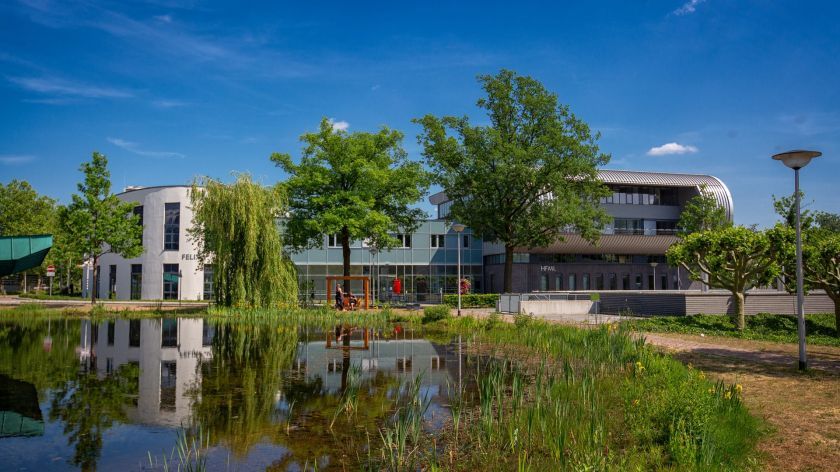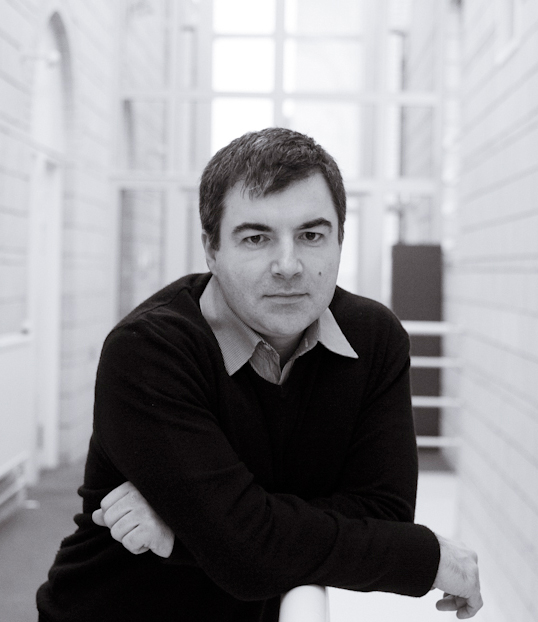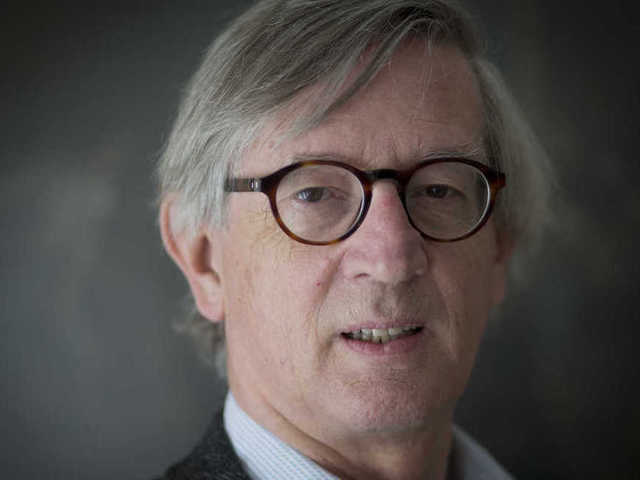-
 HFML-FELIX. Photo: Dick van Aalst
HFML-FELIX. Photo: Dick van Aalst
The Nijmegen-based magnetics and laser lab HFML-FELIX, which is dealing with financial troubles, is unique and irreplaceable. That is what Nobel Prize winner Konstantin Novoselov and former HMFL director Jan Kees Maan say. ‘The Ministry of Education, Culture and Science should, albeit through the Dutch Research Council, have the courage to structurally finance this lab.’
Early in his PhD research, Konstantin Novoselov explains, he had to perform some crucial experiments in a highly magnetic field. That was only possible in Nijmegen. ‘For our research, it was detrimental that we had access to the facilities at the HFML magnetics lab’, he says.
The research has paid off for the Russian-British physicist: for the discovery of graphene, a chicken-wire-like structure of carbon, he and his then-supervisor Andre Geim were awarded the Nobel Prize in Physics in 2010.
In present day, Novoselov, now affiliated with the University of Manchester, remembers the many hours he spent in the Nijmegen lab fondly. ‘It was a great and lively time’, he says. ‘We had an energetic team of students, technicians, and professors. I very much enjoyed it.’
‘Enormous waste’
Last week, news broke that the Nijmegen-based magnetics and laser lab HFML-FELIX is in serious financial trouble. The cause is the expiry of two 10-year contracts between Radboud University and science funding body the Dutch Research Council (NWO). Negotiations for a new contract are ongoing. In the meantime, Radboud University is still providing millions out of necessity, resulting in a predicted loss for the Faculty of Science (FNWI) this year.
The uncertainty of HFML-FELIX’s funding is not new: the problem has been ongoing for at least twenty years. That is what Jan Kees Maan says. He is the founder and former director of the HFML lab and was co-supervisor for Novoselov’s dissertation. Maan ran the magnetics labs from its founding in 2003 to his retirement in 2014, five years before the merger with laser lab Felix – nowadays he lives in Italy.
That NWO’s funding has come to a halt for now, reminds Maan of the situation in 2003, when the HFML lab was being built. ‘We had received funding of around 28 million euros to construct the building and the equipment, but there was less money for exploitation’, he says. ‘By only utilising 30 percent of the capacity, we succeeded in getting the Nobel Prize to the Netherlands. In hindsight, an evaluation committee confirmed that it was an enormous waste for such a beautiful lab to be underfunded.’
However, structural funding for HFML failed to materialise. Instead, in 2010 and 2011, Radboud University entered into long-term contracts with FOM (predecessor of science funding body NWO, specialising in funding physics research, ed.) and with NWO. ‘Several interim evaluations by NWO repeatedly showed that we should receive structural funding’, says Maan. ‘But that never came.’
CERN
The problem, says the former director, is that Dutch science funding body NWO mainly funds smaller research projects. For large and fundamental research using large facilities, there is much less room. ‘By insufficiently recognising the greater scientific and national importance of HFML-FELIX, NWO has let things run their course for too long, even though it now really is time to take action.’
A shame, thinks Maan, because the Netherlands has almost no large research institutes with international allure. ‘That damages our international position. HFML-FELIX is the only lab in the Netherlands to have produced a Nobel Prize. You can’t let that go bankrupt, can you?’
According to Maan, the magnetics lab needs about 5 to 8 million euros a year from the Dutch government. ‘That’s not a lot of money if you compare it to the Dutch contributions to particle accelerator CERN (about 50 million euros a year, ed.) or to ESA’s telescopes (about 35 million euros a year, ed.). These do not go through NWO either, but through the Ministry of Education, Culture and Science. In Germany, France and Italy, the government distinguishes between funding small and scientific projects and large research infrastructures. That should also be the case in the Netherlands.’
Clear agreements
Dean of the science faculty Sijbrand de Jong told Vox earlier that Radboud University is pushing for a construction in which HFML-FELIX would become a national NWO institute, just like the sustainable energy lab DIFFER in Eindhoven and Amsterdam’s Nikhef, which conducts research into particle research.
Maan also thinks such a construction could be a good solution. Not only for funding, but also for the position of staff in the magnetics and laser lab. After all, at HFML-FELIX, PhD students and postdocs always spend a lot of research and teaching time supervising foreign researchers. A process to reduce the workload is therefore currently under way.
‘National NWO institutes have their own legal entity’
In a national NWO institute, that problem would be off the table, says Maan. ‘Such institutes have their own legal entity. Their staff have a special relationship with the university, in agreements you can lay down what expectations for education and research they have to meet. Nikhef staff also do education and research, but the agreements on this are much clearer.’
Irreplaceable
According to the former HFML director, if the negotiations between NWO and Radboud University were to fail, HFML-FELIX is doomed to become a small, regional lab with a limited number of researchers. ‘Then the investment will not be taken out of the lab,’ he says. ‘Only 30 percent of the capacity is then used, then you give up all your ambition.’
‘The expertise of the magnetics lab is unique in the world’
Still, Maan thinks things will work out. ‘In the past, plenty of people, especially once they have seen the lab, have expressed their support’, he says. ‘The mayor of Nijmegen, the Province of Gelderland, administrators at NWO, members of the Lower House and the Council of State: they all think it’s a great lab. The Ministry of Education, Culture and Science should have the courage to fund HFML-FELIX structurally.’
Nobel Prize winner Novoselov also thinks it is detrimental that the Dutch government invests in the Nijmegen institute. Several of his colleagues and PhD students have conducted experiments there in recent years. ‘It is a unique facility; the expertise to build highly magnetic fields is unique in the world. That’s why the lab is irreplaceable.’
Translated by Jan Scholten.





